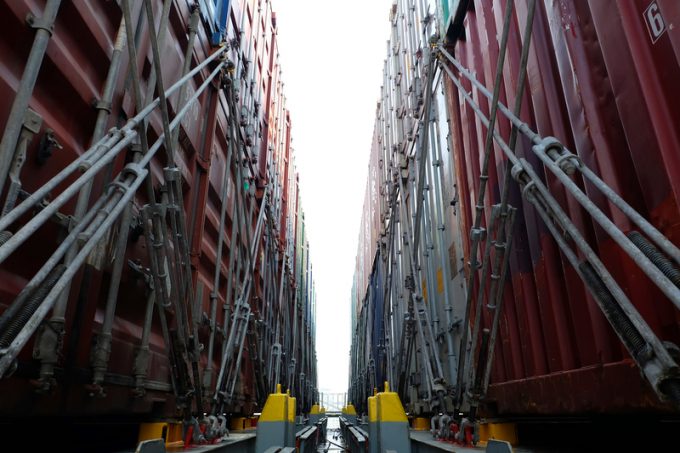Aluminium deal prompts DFDS ro-ro service
Danish ferry and road freight logistics operator DFDS is set to launch a ro-ro freight ...

Six European feeder and shortsea lines are challenging the extension of a “dockers’ clause” covering container lashing operations in ports to Europe.
The dockers’ clause stipulates that lashing operations must be undertaken by International Transport Workers Federation (ITF)-affiliated unions and originally became part of the International ...
CMA CGM South Korean staff strike over bonuses after bumper 2024 profit
MSC switches two more Asia-Europe port calls from congested Antwerp
Ports and supply chain operators weigh in on funding for CPB
Nightmare for Bangladeshi exporters as congestion and tariffs bite
Carriers introduce surcharges as congestion builds at African ports
Box ship overcapacity threat from carrier appetite for new tonnage
CMA airline returns two freighters, while ANA takeover of NCA looms
Tradelanes: Export boom in Indian sub-continent triggers rise in airfreight rates

Comment on this article
Patrice caron
January 07, 2020 at 6:03 pmShipowners arguments 7Euro/container will drive them to more polluting transport mode, bullshit, 7 euros is nothing and it will probably be more like 1euro… Time to load and discharge, well, just think of it in advance, all shipowners are bond by this rule so all equal. They may show some frustration at the beginning but will fate out as time go by, like any changes.
Reasons for using national dockworkers; Right to refuse unsafe work, work is being done on board a ship docked in a “national” port, which means jobs are for “national” workers, Jobs are in a port, meaning it’s for dock workers, wages are fully paid to dockworkers,
Dockers’ clause would not have come up if workers did not notice abuses, so where there are abuses, workers stand together to fight them.
Seafarer
May 26, 2020 at 11:54 amWell, these are huge claims here Mr. Caron.
The public tariff for the Eurogate group advices a per container rate of 34 EUR per unit + another 17 EUR per unit twistlock fee.
Thats 50 EUR away from your claim of it just being 1 EUR per container.
And guess what, thats only 1 side of the sea transport. If oyu load a unit, you would also have discharge it. So another 51 EUR on top and suddenly we have another fee of 100 EUR per unit for a transport from Hamburg to Bremerhaven on top of the handling fees the lines have to pay to move a unit via sea.
So total extra costs per unit are min 200-250 EUR per unit.
Guess what, a trucking costs less and it is fully flexible to deliver directly door-to-door without requirements to touch 2 ports.
Are you also aware, that the crew gets paid for this job? They are dependent on the bonusses they receive and they are also represented by the ITF. Is a seafarer not allowed to earn extra with bonusses?
Will you as docker be responsible if the lashing you did on a vessel was not seaworthy?
Will a docker go on board of a vessel and redo the lashing after a storm putting themselves in a position to trust their rlife into another pair of hands and hope they did the job properly in the ports?
Who will pay for the relashing in case needed, while a big ocena vessel is approaching?
Will you send our the small feeder not seaworthy or is that job suddenly not dangerous anymore for the crew?
Please let us consider all angles, before sending out claims, which can be easily proven to be wrong!